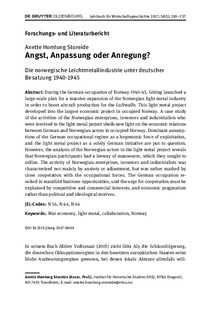Angst, Anpassung oder Anregung? Die norwegische Leichtmetallindustrie unter deutscher Besatzung 1940-1945
Journal article, Peer reviewed
Published version
Permanent lenke
http://hdl.handle.net/11250/2492916Utgivelsesdato
2017Metadata
Vis full innførselSamlinger
Sammendrag
During the German occupation of Norway 1940-45, Göring launched a large-scale plan for a massive expansion of the Norwegian light metal industry in order to boost aircraft production for the Luftwaffe. This light metal project developed into the largest economic project in occupied Norway. A case study of the activities of the Norwegian enterprises, investors and industrialists who were involved in the light metal project sheds new light on the economic relations between German and Norwegian actors in occupied Norway. Dominant assumptions of the German occupational regime as a hegemonic force of exploitation, and the light metal project as a solely German initiative are put to question. However, the analysis of the Norwegian actors in the light metal project reveals that Norwegian participants had a leeway of manoeuvre, which they sought to utilize. The activity of Norwegian enterprises, investors and industrialists was characterized not mainly by anxiety or adjustment, but was rather marked by close cooperation with the occupational forces. The German occupation resulted in manifold business opportunities, und the urge for cooperation must be explained by competitive and commercial interests, and economic pragmatism rather than political and ideological motives.
